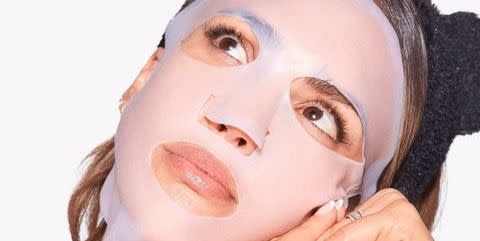It's Time To Break Up With Your Sheet Masks And Try Reusable Silicone Ones

I’m not going to lie: There are a lot of things I don’t enjoy about sheet masks. They’re messy, they’re sticky, they never fit on my face or feel comfortable, and worst of all, they seem incredibly wasteful. Most disposable sheet masks will come with the sheet mask itself, the pouch that holds the sheet mask, and sometimes, another piece of plastic inside the pouch, holding the sheet mask together. In many cases, you end up throwing it all away, including some of the pricey serum packed into the pouch. So basically, sheet masks are contributing to saving you money, beauty products, and the environment.
Should you ditch your regular sheet mask?
Shereene Idriss, MD, a board-certified dermatologist, also isn’t big on sheet masks in most cases, especially for everyday use, since they aren't eco-friendly products. “I like [face masks] to ‘treat’ myself every once in a while because the experience can be soothing and calming, but from a practical standpoint, I am not a fan,” she says. “The waste that comes through just with the packaging alone, and the fact that the masks themselves are usually not biodegradable, [is a problem].”
Wasteful packaging aside, you might be wasting your pricey skincare ingredients with the continued use of disposable sheet masks, too. “Contrary to a lot of sheet masks' intentions ‘of allowing products to penetrate better,’ I find that a lot of the actual valuable skincare product goes to waste with masks,” says Dr. Idriss. “So much is left behind within the pouch and on the mask itself, that I find it wasteful. If a mask is needed to make a product more effective, then I'd question the efficacy of the product being used (my exception to this is when the mask is being used to really seal in moisture).”
What are the skincare benefits of silicone sheet masks?
In an effort to tackle excessive sheet mask waste, lock in lots of moisture, and please the millions of sheet masks fans nationwide, some companies have created reusable, silicone-based sheet masks that you can use with your own skincare products. “Silicone masks are a much better alternative than their cloth counterpart—they are more effective on every level,” explains Dr. Idriss. “First, they don't dry out easily, allowing them to be used to lock in moisture. Second, they can be repurposed and reused after washing. And third, silicone has been proven to draw up moisture from within. So, win, win, and win.”
The mechanism in which silicone sheet masks work is vastly different than how disposable sheet masks perform. Unlike disposable sheet masks, which are made of a material that actually absorbs most of the product itself (and doesn’t leave very much behind for your face), silicone masks aren’t able to absorb product, so you can be assured that your skin is actually getting the beauty boost it needs, and not the sheet mask itself.
Is it true that silicone masks can help heal scars?
“The main purpose from my perspective of a silicone sheet mask would be to help boost moisture retention, and to be used as a cooling mask to soothe inflammation,” explains Dr. Idriss. Also a fan of silicone sheet masks, board-certified dermatologist Rita Linkner, MD, “recommends [her patients use them] after laser procedures or even surgical procedures that have scars which need to heal.”
Rather than absorbing any of the product, silicone masks are able to create a sealed environment to lock moisture in. “Silicone draws moisture to itself, and that hydration is great for wound healing,” explains Dr. Linkner. “It also works to draw the right anti-inflammatory signals to the area, targeting the correct cells to heal a wound and promote collagen development.”
Sooo, how do you apply a silicone sheet mask?
To use a silicone sheet mask, Dr. Idriss recommends purchasing one for just yourself, since you’re going to be able to continually reuse it for at least a year. Also, make sure your mask is cleaned and washed with soap and water after each application, ensuring it's clean and ready to be used before your next. “Once you've finished going through all steps of your night-time routine, mask away!” exclaims Dr. Idriss. “I wouldn't necessarily recommend it for the morning (because who has time) but if you insist, you can use your mask after moisturizing, but before you apply your sunscreen (which should be your final step).”
Considering silicone draws water to itself and also creates an occlusive (AKA super hydrating) barrier to repair the skin’s barrier, it’s a great addition to anyone’s winter skincare routine, according to Dr. Linkner. Below, you’ll find a few of our favorite silicone sheet masks, including picks for your brow line and undereyes, to use on top of your hydrating serums and moisturizers.
You Might Also Like
